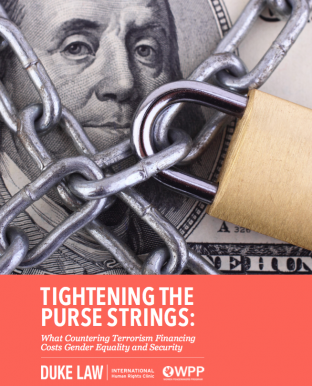March 2017

The report, Tightening the Purse Strings: What Countering Terrorism Financing Costs Gender Equality and Security, analyzes how countering terrorism financing rules impact women’s rights organizing, women’s rights organizations, and gender equality. Introduced in the aftermath of the events of September 11, 2001, the international community brought a new focus and urgency to prioritizing countering terrorism financing, including through criminalization, sanctions and freezing of assets, and de-risking. To date, the gender and human rights implications of these countering terrorism financing policies have escaped scrutiny.
Tightening the Purse Strings: What Countering Terrorism Financing Costs Gender Equality and Security represents the culmination of research, interviews, surveys, and statistical analysis carried out by the International Human Rights Clinic at Duke University School of Law and the Women Peacemakers Program in the Hague, the Netherlands, to begin to fill this gap in understanding how responses to terrorism and violent extremism may in practice squeeze women’s rights and their defenders between terror and counter-terror. As a direct and indirect result of these rules, women’s rights organizations have lost critical access to resources, as well as the ability to fully use banking facilities, all of which circumscribe how, where, and in some cases, even if, women’s rights organizations can undertake their core work on mobilizing human rights, gender equality, and advancing the women, peace, and security agenda.